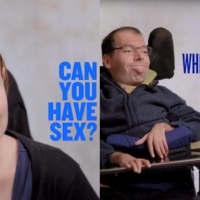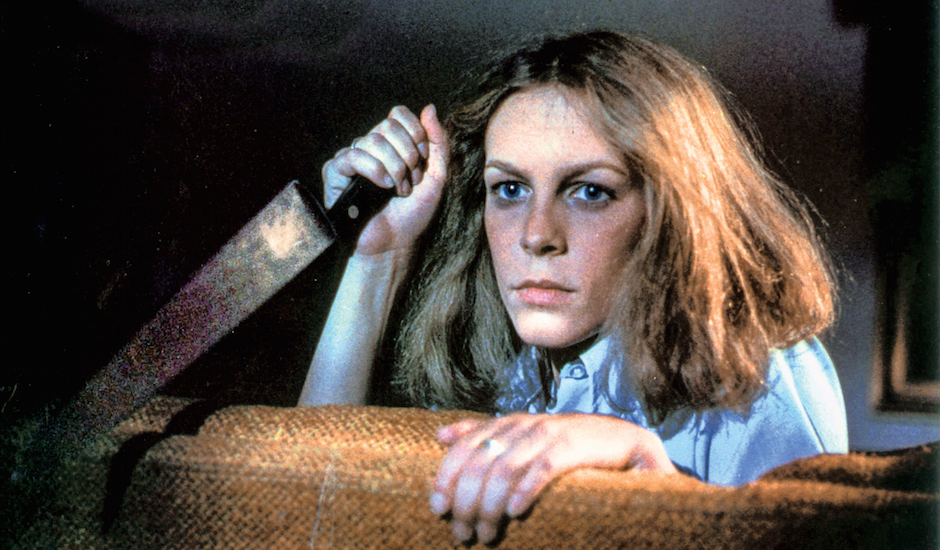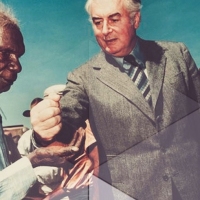 The Right Stuff #4 – You Can’t Ask ThatWho knew reality TV could actually make you think?!
The Right Stuff #4 – You Can’t Ask ThatWho knew reality TV could actually make you think?!

Feminism & "The Final Girl"
The evolution of female characters in horror flicks.
Words by Pasha Nielsen. Header image from Halloween (1978).
Ah, the humble slasher flick. You know the drill; a group of attractive teens visit somewhere secluded for a night or a weekend of sex, booze and sin, only to be picked off by a mysterious killer, one likely to have some form of debauchery under their belt. These guys pop up in pop culture everywhere. We see Groundskeeper Willie as Freddy Kreuger in The Simpsons and understand the reference, regardless if we've actually seen The Nightmare on Elm Street or not. You don’t have to watch Texas Chainsaw Massacre to know Leatherface, or Halloween to know Michael Myers (the cheeky scamp). We watch these movies to see hot 80s chicks slaughtered and do stupid things like not call the police or check where that mysterious noise has come from.
It is hard to overlook in this day and age, however, the treatment of women in these films. The lone survivor is often the nerdy girl who won’t drink or fuck anyone at the lake house. She’s likely to have carried some binders across her chest at some point in the movie. She comes out on top, a reward for her purity. Her friends are fun, have big tits and wear white shirts when they get stabbed. They’re hooking up with Bobby Ballplayer and Johnny Jockstrap while simultaneously drinking a tall can of beer. They tell her to stop being such a narc.
Academically she’s called the Final Girl, and she represents the desirable woman of the time. She exudes submission, yet she holds the guile of reliability and bravery. She’s not very fun, rather a ‘take her home to mum’ type. The Final Girl prototype is important here, as we see her morph and evolve with the waves of feminism.
Our Final Girl of the 80s was a reproduction of the budding movement of second wave feminism, which had a primary focus on women’s sexuality. Our Laurie Strodes (Halloween), our Sally Hardestys (Texas Chainsaw Massacre) and our Jess Bradfords (Black Christmas) all seemed on the cusp of sexual freedom. Their representations as good, wholesome girls rallied against the changing face of women in America, leaving characters that seemed to wrestle with their own values. Lila Crane in Alfred Hitchcok's Psycho compared to Julie in I Know What You Did Last Summer is a mere shadow of her sexual freedom and confidence. From aspects such as costuming, scripting and performance we can clearly see the social and therefore cultural impact of feminism in our beloved slashers.
While the sub-genre lost its traction after the 90s, we see the emergence of films such as Wolf Creek and Wrong Turn, which subvert our Final Girl figure with a Final Boy. Read into that what you will, but considering the 2000s brought with it the steamrolling force of third wave feminism, a major branch of which was the disassociation of gender defining the self, or rather, the concept that your gender does not limit you. The introduction of the Final Boy suggests a reflection of the former. If a classic prose such as the virginal as fuck Final Girl surviving because she’s a virginal as fuck girl can be flipped onto its head and replaced with a somewhat normal male figure, what does that say about gender defining actions?
Again, not feminist directors, but feminist values in the modern woman dictate our characters.
Especially illuminating is the comparisons of our 80s faves with their late-2000s remakes. Laurie in the original Halloween doesn’t kill Michael Myers, she hides in the cupboard while Dr Loomis saves the day. Laurie in the 2007 remake however, straddles an unconscious Myers and shoots him in his murderous face. We see Jess in the 70s flick Black Christmas sedated and sent to bed, whereas her revamp as Kelli in the 2006 remake actively kills the homicidal Billy by pushing him onto the spike of a Christmas tree.
Obviously we know our women of cinema will be more forward thinking than their 80s counterparts, but to link a genre known for being the bottom tier of horror, it’s incredibly interesting to see how something as important as feminism can affect popular culture even in areas such as cheap horror movies.
The slasher is a fun movie. It’s a movie to plonk on while you’ve posted yourself up on the couch with some teevee snacks, or when you’re testing the new intimacy waters with a guy you’ve just started seeing. The slasher is by no means the type of film to mirror against your social or political ideals, or even turn your brain on to watch. Historically, the slasher is what the kids of the 80s enjoyed as a cornerstone of pop culture, similar to what superhero movies today would be. And it’s nice to see something so traditionally basic to carry the weight of the social discussion of feminism we continue in our own pop culture.
 The Right Stuff #4 – You Can’t Ask ThatWho knew reality TV could actually make you think?!
The Right Stuff #4 – You Can’t Ask ThatWho knew reality TV could actually make you think?!
 The Right Stuff #5 – The Wave Hill Walk-OffFifty years on, Australians have the chance to reflect on how far we’ve come and how much further we can go.
The Right Stuff #5 – The Wave Hill Walk-OffFifty years on, Australians have the chance to reflect on how far we’ve come and how much further we can go.